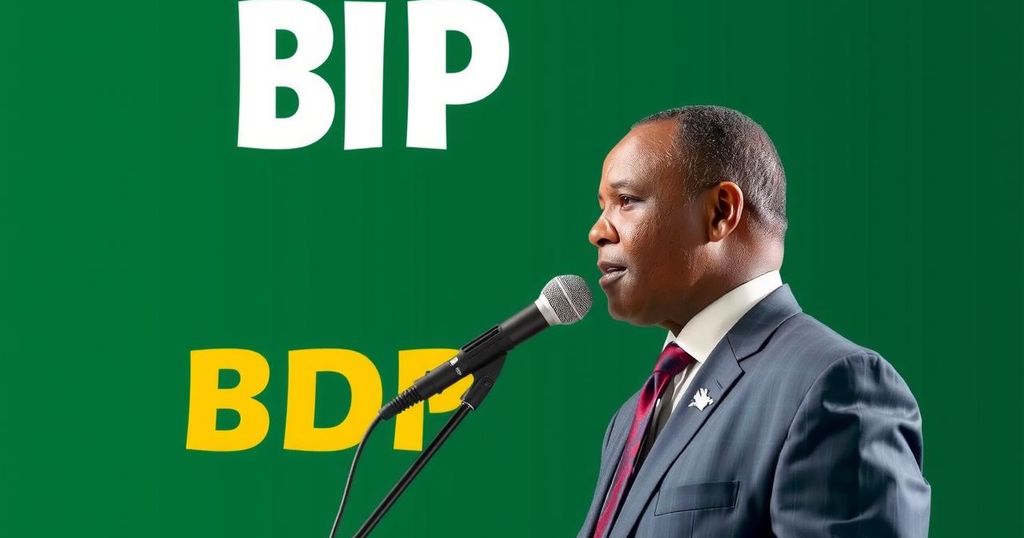In Botswana’s upcoming general election, the ruling Botswana Democratic Party (BDP), in power for almost sixty years, is urging voters for change under President Mokgweetsi Masisi. Despite historical successes in governance, the BDP faces challenges of high unemployment and inequality, prompting skepticism from opposition parties. The election results remain unpredictable, influenced by both public dissatisfaction and the potential splintering of opposition votes.
Botswana’s long-standing political party, the Botswana Democratic Party (BDP), which has maintained power for nearly sixty years, is making a bold appeal for change as it seeks re-election in the upcoming general elections. President Mokgweetsi Masisi, who has led the country since 2018, underscores the need for transformation in his manifesto, inviting citizens to join in a collective effort for prosperity. This shift highlights the mounting criticisms from opposition factions regarding governance issues, despite the BDP’s historical success in parliamentary elections since Botswana’s independence in 1966. Botswana has successfully transitioned from a developing nation to one with relatively high living standards, largely due to its significant diamond resources. Despite these achievements, economic problems persist, characterized by high unemployment rates, especially among youth, and stark income inequality as indicated by the Gini index. In response to these challenges, President Masisi emphasized his administration’s commitment to job creation, aiming to generate 300,000 new opportunities, while negotiating beneficial terms with De Beers to increase national revenue from diamond mining. Opposition parties, however, criticize the BDP’s attempts to portray itself as a messenger of change, arguing that its past suggests a maintenance of the status quo. They contend that while Botswana ranks well in governance, there are deep-seated sentiments of corruption and dissatisfaction among citizens toward current governmental leadership. This sentiment is reflected in polling data from Afrobarometer, which suggests a significant portion of the population lacks trust in President Masisi and his government. Political dynamics may play a critical role in the electoral outcome. Opposition parties, despite their fragmentation, can potentially capitalize on public discontent to mount an effective challenge to the BDP. As campaigning intensifies, predictions for the election remain uncertain. Political analysts note the risk of vote-splitting among opposition factions could inadvertently facilitate the BDP’s continued dominance. The forthcoming elections will be a crucial test for the ruling party, examining whether it can convincingly address the demands for change voiced by the populace.
The political landscape in Botswana is shaped significantly by the BDP’s historical dominance, having governed since the country’s independence in 1966. The party has been instrumental in Botswana’s socio-economic development, transitioning from a nation with minimal infrastructure to one known for relatively high living standards, primarily due to its diamond wealth. However, recent economic challenges, characterized by high unemployment and inequality, have led to mounting pressures for change. The BDP’s recent claims of advocating for change are met with skepticism from opposition parties, which question the party’s credibility and ability to address long-standing issues. This election cycle is poised to test voter sentiment against the backdrop of the BDP’s legacy and the emerging demands for reform in the governance of Botswana.
In conclusion, Botswana’s upcoming elections represent a pivotal moment in the country’s political narrative, as the BDP seeks to maintain its long-standing power amidst growing calls for change. President Masisi’s appeal for unity and transformation juxtaposes against a backdrop of significant socio-economic challenges and opposition criticisms. The future political landscape will depend on whether the BDP can address the aspirations of the electorate for improved governance and economic opportunities, or whether the opposition can successfully leverage public discontent to reshape Botswana’s political trajectory.
Original Source: www.bbc.com






